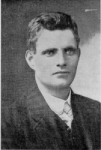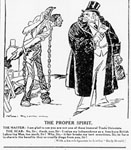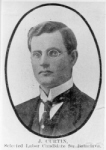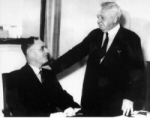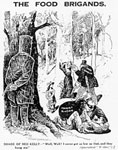
Two years after John Curtin took on the position of secretary of the Victorian Timber Workers' Union, the first issue of the union's paper, the Timber Worker, was published in February 1913, with Curtin as its editor.
John Curtin, 1912. Records of the National Library of Australia. John Curtin in the Melbourne Punch, 1912. JCPML00438/1.
Curtin wanted to produce a paperwhich had a wider impact than just servicing the membership.
His writing became less 'literary'. He even told his contributors that 'space is exceedingly limited and that short articles and crisp paragraphs have the best chance of publication'.
Despite this brief, he allowed himself the freedom to editorialise - at some length. His first editorial was an enthusiastic exposition of the paper's aims and the readers' responsibilities entitled 'Ourselves'.
Ourselves
------
We are to teach and learn! The "Timber Worker" goes forth to inform the rank and file regarding essential questions of life and death. It will bring to the forest camp and the spot mill tidings of the march of industrial events. Men in the remote places will be told of the union doings, its needs, and the of the manner in which it proposes meeting those needs; they will learn of the changes in the awards, the alterations in rules, the departures in policy, and the general management of the organisation, which is their property, and which, Above all, is the instrument of their social elevation, and the bulwark of their economic power.
Timber Worker February 1913
Lloyd Ross observed that this was 'a characteristic article from Curtin's pen - vague in its content, serious in its mood, long-ranged in its lesson'.
Above the Timber Worker mast-head, Curtin would, however, leave messages which were anything but vague.
The space was also a favourite place for educational or inspirational messages from the Editor.
Messages above the Timber Worker Mast-head
"Quarter Night February 10, 1913 - Remember Your Dues."
Timber Worker February 1913
"It is possible to understand that the Savage Races of the Universe should worship Idols, but it is inexplicable that the Civilised World should esteem its Idlers."
Timber Worker 7 February 1914
Curtin wrote regular reports about arbitration court decisions, compensation, timber-cutting rates, employers' rorts, changes in forestry practice, and even the results of the married women's race at the union picnic.
He also borrowed the engravings and woodcuts of cartoons from a variety of sources to cut publication costs.
John Curtin obviously loved journalism. There was also a certain appeal in getting his hands stained with glutinous printer's ink.
But he was frustrated: he always had to do it on the run. The monthly production of his paper had to be fitted into a program which might include country membership drives, meetings under the forest canopy, campaigning as an ALP candidate, speeches to members on socialism, visits to metropolitan timber yards, checks on finances, and dealing with insurance claims.
John Curtin, political aspirant 1914. Records of the Curtin family. Election pamphlet, Balaclava 1914. JCPML00376/62.
He lamented these constraints in his editorial of 7 February 1914, an issue which marked the first year of the Timber Worker.
Curtin solved the problem of his multi-faceted job by publishing long articles by his political mentor Frank Anstey, and his Socialist Party colleague, R S Ross. There was also a contributor with the nom-de-plume Danton who was probably Anstey.
John Curtin and Frank Anstey. Records of the West Australian News Ltd. John Curtin with Frank Anstey in the Depression years, n.d. JCPML00409/4.
Ourselves
-----o-----
The newspaper department of Australian Trades Unions has never been treated fairly. Demonstrably a sphere demanding specialists, it has been left to the fag end of the working day, and to men who are called on to engage in the daily round of administration negotiation, and platform exposition. The opponents of Labor only ask their pressmen to be pressmen. We, on the contrary, lay down the dictum that our writers shall be a thousand other things as well, and at the same time produce journals equal to the best in terms of literature, arrangement, and weight of argument. Unquestionably it is not reasonable.
Timber Worker 7 February 1914
The lay-out, or what Curtin called the arrangement, was inferior in these months when he seemed to leave it to the compositors to fill the pages.
But he still had time to write editorials on union and social issues under headings like 'Mutiny before Murder - Should Strikers be Shot or Exiled?' (March 1914), 'The Struggle for Bread - Increasing Misery and Callous Cabinets' (January 1915) and 'The Famished Legion - Why Should Starvation Reign?' February 1915. .
John Curtin used the Timber Worker to raise these bread-and-butter issues as well as the loftier ones.
Cartoon
'The Food Brigands'
Timber Worker 14 October 1915
--------
Why Should Starvation Reign?
------
The month has but added to the sum of human misery. Everywhere men have been displaced, and the remainder are working less hours than before. Despite all remonstrance and exhortation, the Federal and State Cabinets - Labor and Liberal - accomplish nothing to stay the spreading scourge. The frightful magnitude of the industrial crisis is only equalled by the amazing inaction of the respective governments - it passes understanding! Surely, if ever there was an occasion when Labor-in-Power might be expected to be bold, even defiant, in its proposals of amelioration, now is the hour and here is the place. But it is not so, and the evils begotten of enforced idleness, growing indebtedness, soul torturing anxiety, insufficient food, and a demoralised community are multiplied and accentuated as the days go by.
Timber Worker 10 February 1915
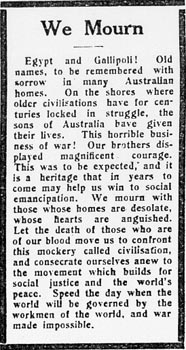
By 1915 anti-war and anti-conscription themes dominated the paper - but with a class-war overlay.
In the Timber Worker of 8 June 1915, there was a black-lined box in the centre of a page headed 'We Mourn' to mark the Gallipoli landing
In the same issue, in his editorial headed 'The People's Armament' Curtin continued the theme of war as a capitalist plot.
He returned to a special edition
of the Socialist with 'Ten Years Ago. Recollections and
Reflections'. His reflections included the continuing thought that:
'Socialism is the only way. It will end war even as it will conquer poverty.'
The
People's Armament.
----o----
Cry
of the Cemetery
Workmen of the world! How answer you this invitation of the graveyard which the policy of the nations actually involves? Their call to your patriotism is but the voice of a dead monster, against whom you struggled triumphantly, asking for resurrection in order that you might once again be assailed.
Timber Worker 8 June 1915
Curtin began to feel he was leading a union whose members were more interested in the generous insurance arrangements than in a path to socialism. He provided a clue to his discontent with a page one story headed 'What's Wrong with the Workers? '
Curtin believed the trouble lay with the craft unions and the solution was in amalgamations of smaller unions into effective, industry-wide bodies.
What's
Wrong with the Workers?
=====
".. day by day the attempt to amalgamate unionism - to make it an all-powerful force in the elevation of the human standard - is obstructed, side-tracked and defeated because of misplaced concern in regard to unemployed grants, superannuation allowances, and a thousand and one other of the aspects of our collective benevolence....
The supreme requirement of our day is Industrial Organisation. The old weak Craft Unionism has to go and whatever be the steps needful in this connection, they must be taken."
Timber Worker 8 July 1915
In October 1915 Curtin's epitaph as the timber workers' advocate appeared above the masthead of his paper.
Seemingly, the public and private demands were getting too high. But the clues apparently were unnoticed by John Curtin's union or his friends: it was a shock to them when he resigned the following month, giving 'health and personal inclinations' as the reasons.
The Timber Worker published his resignation letter and an extended comment by his successor, Mr R. Bowers.
Message above the Timber Worker mast-head
"To do one's best here and now, with the wretched tools one has to hand, in the teeth of indolence, obstinacy, and the spirit of routine, to compromise where one cannot overcome, and instead of sitting picturing some golden future, to do at once the little one can, is what progress demands of us."
Timber Worker12 October 1915
-------
Comrades, - Having terminated my association with the Union as its Gen. Secretary, I wish, more than words can ever convey, to ask your acceptance of my deep gratitude for the loyal co-operation and unswerving confidence received at your hands since March 1, 1911.
Timber Worker23 November 1915
------
R. Bowers
All will fully recognise that my new duties will involve much time, patience and thought, especially having to succeed such a capable and proficient writer as our highly-esteemed comrade, J. Curtin.
Timber Worker23 November 1915
